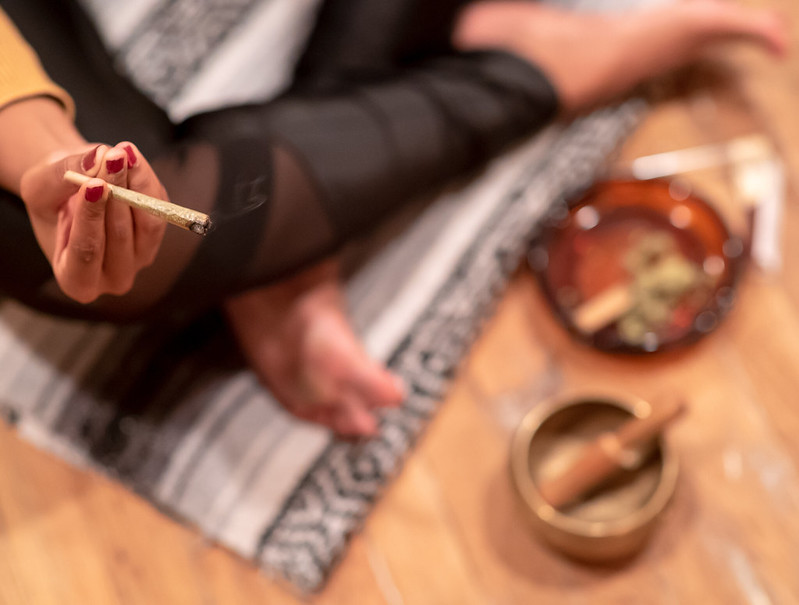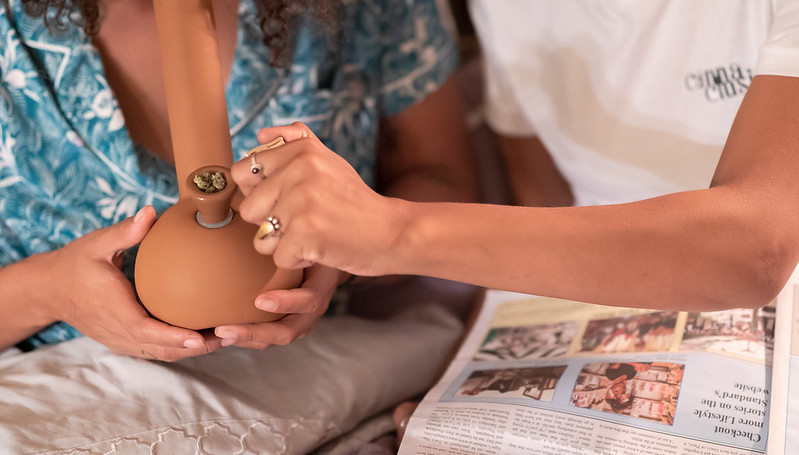My journey with cannabis started approximately three years ago. I’d initially started using the herb because of the unpleasant ebbs and flows caused by my medication, Venlafaxine and Lorazepam. I’d been on a disgustingly high daily dose of the Venlafaxine to treat my major depressive disorder (MDD): 150mg. I also used 0.5mg of Lorazepam daily for my generalized anxiety disorder (GAD), as needed.
Venlafaxine didn’t always work. Especially after a few weeks. Recalling the functional normalcy of friends and other loved ones who used cannabis despite the “brain-cell killing” fearmongering, I became curious about how cannabis could help me. After checkered use over three years, I returned to the herb after a string of traumatic life experiences and worsening mental health. I could no longer afford my medication, so it was the best solution available. Unsurprisingly, it provided immediate relief for my conditions.

Tammy Pettigrew, founder of the cannabis education and advocacy platform, The Cannabis Cutie, was similarly introduced to the herb. Despite everything society had taught her, she changed her perspective when a fellow college student regularly consumed cannabis, and yet excelled beyond her own capacity in school.
“I noticed changes in my life. I was a lot more calm, I was getting more rested, I was doing better with my anxiety. I actually even became a lot more spiritual once I started my cannabis use.” She also recalled sharing a topical cannabis product with her father, who has arthritis. Within minutes, someone who had been adamantly against the herb was appreciative of its healing effects.
Yet, employers are not as enthusiastic about the benefits of cannabis and still take every opportunity to disproportionately punish non-white job-seekers for its use. Once I had applied for a seasonal position at a company I’d worked with the year before. They’d regarded me as a highly valued employee, and the District Manager had even written college recommendation letters in my favor. Still, after I sent along medical records reflecting my mental health conditions and psychiatrist’s acceptance of my cannabis consumption, the District Manager immediately rescinded the job offer.
Systematic tools of discrimination run deep. Research has shown that although marijuana use has a significant, negative impact on men’s employment prospects, Black women are especially targeted for it in the workplace.
Pettigrew has had her own share prejudice while living in the intersectionality of Blackness and cannabis consumption. When applying for life insurance, the insurer learned of her use and gave her the highest possible rate. Without the help of her white underwriter to help advocate for her, she would not have been given fair treatment. In numerous facets of life, Black cannabis users face a double-whammy of prejudice that excludes us from the privileges granted to our white counterparts.
Being Black and Using Cannabis in the U.S.
These stories are not unique to us. For one, communities of color have significantly less access to healthcare than white people (African Americans are almost twice as likely to lack health insurance than whites), barring basic healthcare opportunities for mental illnesses such as mine. Although we consume marijuana at similar rates (and for similar medical reasons), we are far more likely to be severely punished for this choice.
“Our systems can discriminate – legally – against you. It is not a coincidence,” Pettigrew asserted. For those detained, rather than merely denied unemployment, the enduring consequences are far more severe. Given the consistency in discrepancies between legal and professional penalties between Black and white cannabis users over the last decade, it is clear that these biased systems are not broken. Instead, they are working just as intended. “It is not a coincidence that the same amount of Black people that cannot vote [due to marijuana sentences] is around the same amount that could not vote before the Civil Rights era.”
As of 2018, 42.4% of Black people reported having used marijuana versus 50.7% of whites. Yet, the arrest rates do not reflect these proportions. Across the U.S., Black people are 2-10 times more likely to be arrested for marijuana possession than their white neighbors, even when living in the same county. Now, when prison populations are dying en masse due to the novel coronavirus, the U.S. must face a reckoning that lays bare how racially charged the war on drugs is in this country.

Racially Targeted Marijuana Arrests Across the U.S.
Disparities in marijuana possession arrests exist in every state across the U.S. – this is not a phenomenon unique to a specific region of the country. In 2010, the data unfolded as follows:
- Although Black people comprise 15% of Illinois’ population, they made up 58% of marijuana possession arrests.
- Black people make up 25% of Alabama’s population, yet accounted for 60% of arrests.
- In Kentucky, Black people composed only 8% of Kentucky’s population, yet accounted for 36% of marijuana possession arrests.
- Only 5% of Minnesotans are Black, yet this same demographic made up 31% of marijuana possession arrests.
Ninety-one percent of all marijuana possession arrests in D.C. were Black people. Other states with astronomical disparities included Mississippi, Louisiana, and Georgia, where Black people made up 69%, 61%, and 64% of those who were taken into custody on marijuana possession charges, respectively.
Things have not improved since 2010. Although marijuana possession arrests have declined (presumably due to legalization across several states), racial disparities are only getting worse in 31 states. For 20 of them, the increase in racially-charged marijuana arrests has equated to approximately 25% or more. In Montana, New Mexico, and Illinois, Black versus white arrest disparities increased by 175.6%, 118.7%, and 118.3%, respectively. Decriminalization and legalization have not saved us, either. Even in areas where the herb is legalized or decriminalized, Black people are still more likely to be arrested for possession than white people.
In fact, some of these states worsened. In Maine, for example, the disparity increased from 2.1 in 2010 to 4.0 in 2018. However, in Nevada and California, slight improvements were made (4.0 in 2010 to 3.0 in 2018 and 2.2 to 1.8 in California, respectively).
Now, those who were incarcerated due to racial profiling and politically motivated drug arrests are paying a fatal price for the government’s decades-long targeting of marijuana. As of this past July, the COVID-19 infection rate in prisons was 5.5 times higher than in the general population of the U.S. The death rate was three times higher for the prison population from the end of March to the beginning of June.
Estimates on the number of incarcerated people who have died on marijuana sentences are currently unavailable. What we do know is that there were 1,250,509 people imprisoned by states in 2018, along with an additional 163,653 in federal custody in 2018 for possession alone. Four percent of those people were incarcerated due to drug-related arrests, 8% of those involved marijuana. Cannabis use and possession should not be a death sentence, nor should it invite violent prejudice in any other facets of someone’s life.
Where Do We Go from Here?
In this new wave of the Black Lives Matter movement, juxtaposed to the racially disproportionate deaths by COVID-19, the United States must take a serious look at how marijuana has been weaponized to reinstate Jim Crow-era levels of discrimination in professional, social, and legal realms.
“It starts with us,” Pettigrew suggests. “Representation matters. We can’t have, you know, these mass media people coming in trying to get to our people and talk to them. It has to be us, and I think it has to be on intimate levels… If we can get 50% of the industry for us, you know, these mom-and-pop farms that are producing good quality products and businesses, I think that would be great. In order to do that, I think we would need to be educating our community on how to run a business, how to read the contracts, how to market, how to make business connections, so it can be sustaining. That is what I would like to see in the next 10 to 20 years.”
In stark contrast to how white people have been praised and congratulated for “innovations” in cannabis use since legalization swept the nation, Black people have been vilified and tormented. Healing from the lifelong and generational impacts of targeted incarceration will take not only better representation of Black people in the cannabis industry, but a genuine dialogue between all Americans on the historical weaponization of this herb. There is no better time than now to begin this step into revolution.
About the author: My name is Jazmin “Sunny” Murphy, and I am a science communicator and web content writer. Since 2015, I’ve been producing scientific content that is written in plain English. My love for life science has influenced my professional and academic aspirations since I was a kid. I hold a Bachelor of Science in Zoology and 21 units of a Master’s education in Environmental Policy & Management (concentration: Fish and Wildlife Management). You can learn more about me and my science writing and reporting work at my website, Black Flower Writing Services.